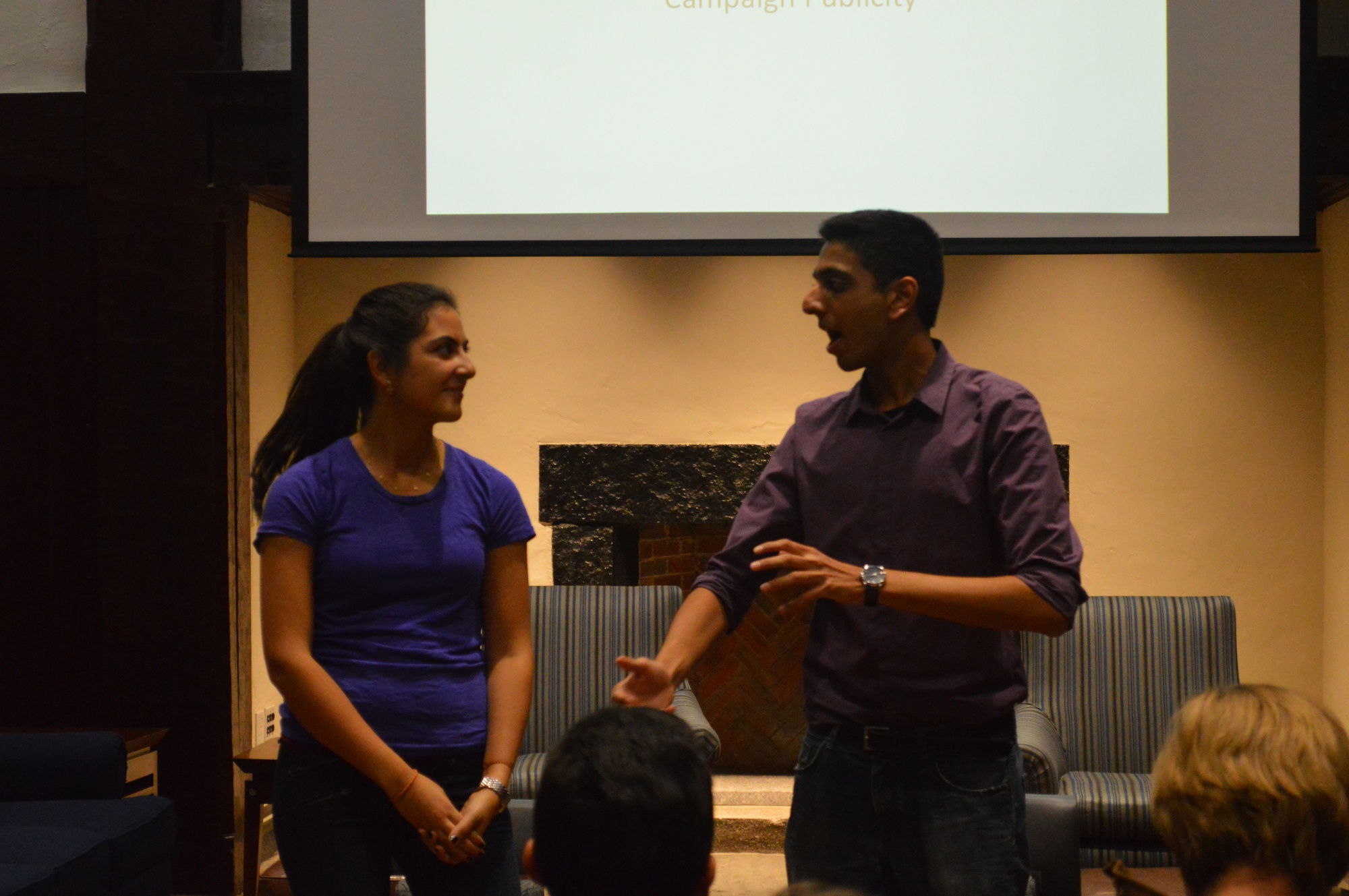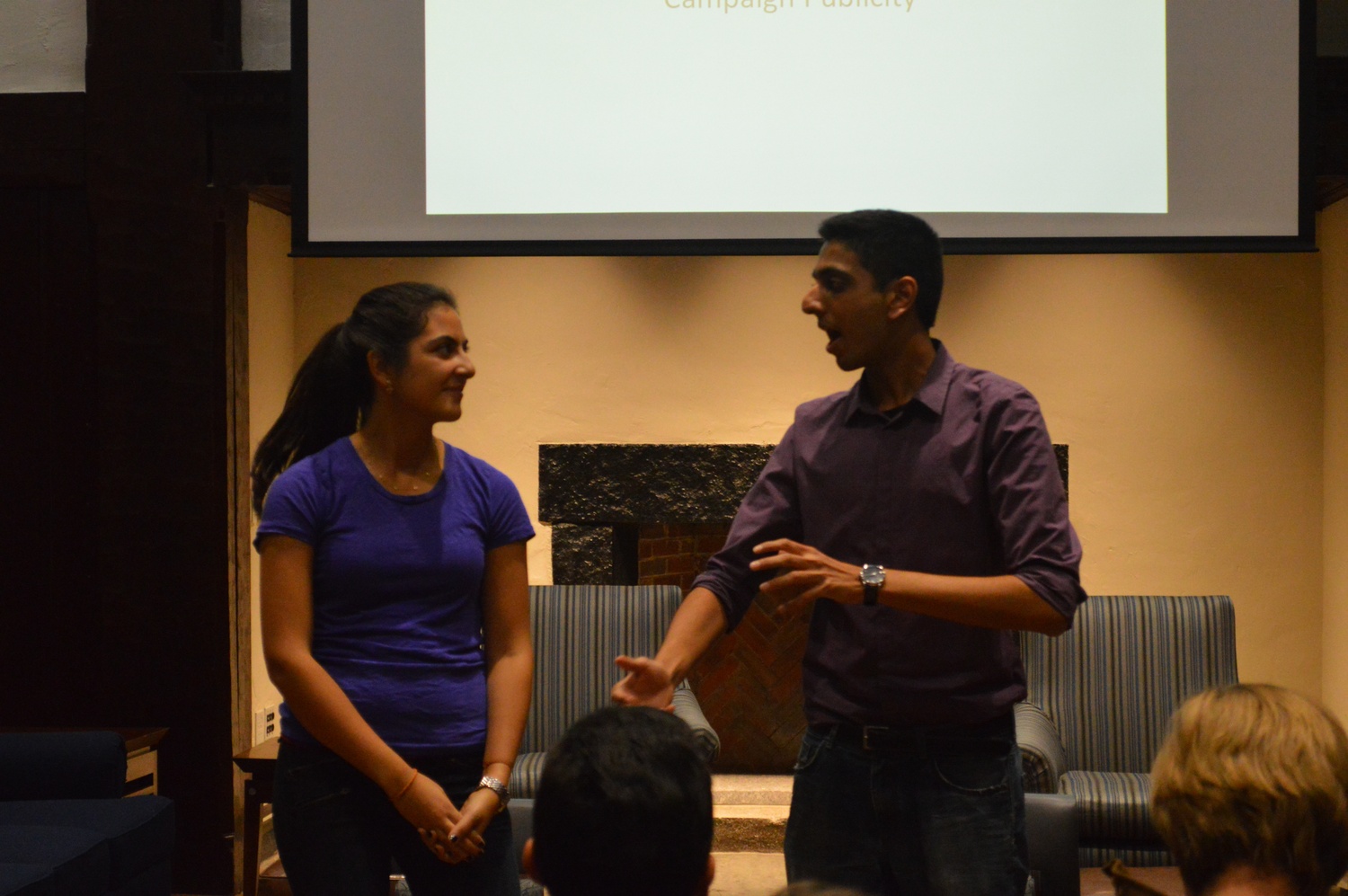
News
Garber Privately Tells Faculty That Harvard Must Rethink Messaging After GOP Victory

News
Cambridge Assistant City Manager to Lead Harvard’s Campus Planning

News
Despite Defunding Threats, Harvard President Praises Former Student Tapped by Trump to Lead NIH

News
Person Found Dead in Allston Apartment After Hours-Long Barricade

News
‘I Am Really Sorry’: Khurana Apologizes for International Student Winter Housing Denials
Nasrollahzadeh-Goyal Win ‘Monumentally Close’ Election

UPDATED: Friday, Nov. 21, 2014 at 4:12 a.m.
Ava Nasrollahzadeh ’16 and Dhruv P. Goyal ’16 have defeated three other tickets to win the Undergraduate Council presidential election in one of the closest finishes in several years.
Of the 3,348 total votes cast in the election—up 5 percent from last year’s tally—946 undergraduates cast first place votes for Nasrollahzadeh and Goyal, only 41 more votes than second place finishing ticket Happy Yang ’16 and Faith A. Jackson ’16.
Nasrollahzadeh and Goyal, both veteran UC representatives, ran on a platform that centered around four F’s: funding, food, freshmen, and fear of missing out. A centerpiece of their campaign was a plan to solicit donations from alumni to increase funding for student activities—an answer to the Council’s current leaders’ failed attempt to demand funding directly from the University.
“It’s a completely overwhelming feeling. We have very few words to describe the situation and the emotion that we feel right now,” Goyal said shortly after learning the results.
The pair ran an organized campaign with a following of about 20 official staffers, several hundred supporters, and a campaign website.
The two were notified of the election results shortly after 10 p.m. Thursday. UC Election Commission Chair Matthew C. Estes ’18 confirmed the results in an email to The Crimson Thursday afternoon under an agreement that the results would not be published until the candidates were notified.
“I am absolutely elated. I know how tough this competition was. These candidates this year were unbelievably talented, knowledgeable, and so gregarious,” Nasrollahzadeh said.
The race was the tightest in at least four years, Estes wrote.
The UC uses a Hare-Clark method to determine the winner, meaning voters rank preferred candidates, and their votes are redistributed in later rounds of tallying after other tickets are removed.
After the first round of calculating the winner, the 152 students who abstained from ranking a first choice preference were redistributed. Only about three hundred first place votes separated the Nasrollahzadeh-Goyal ticket in the first round from the last place ticket of Meghamsh Kanuparthy ’16 and Ema H. Horvath ’16.
Once votes for Kanuparthy and Horvath were reallocated, Nasrollahzadeh-Goyal led Yang-Jackson by about 40 votes, and Luke R. Heine ’17 and Stephen A. Turban ’17 by about 250 votes.
The final calculation came out favoring Nasrollahzadeh-Goyal over Yang-Jackson by about 70 votes, about 2 percent of the total voters, and marked an end to a crowded and close election.
Estes wrote that by Tuesday night, the race was “monumentally close.” On Wednesday night, Estes continued that rhetoric, indicating in an internal email to candidates that the election was “incredibly close.”
In the subsequent hours, candidates scrambled to attract voters, sending mass emails and messages to students, at times times questioning whether the election could be a four-way tie.
At one point, Estes wrote, the difference in first place votes between Nasrollahzadeh-Goyal and Yang-Jackson was just eight votes.
“[I am] obviously disappointed. It was a really close race, which means a lot of people stood behind the values and the platform that we stand for,” Yang said, later congratulating the winning ticket.
Kanuparthy and Horvath appeared relieved at the closure of the election.
“It was a lot nastier than I was expecting. I didn’t like the sneakiness. I think it kind of turns you into a different person. I didn’t like the way I was thinking when I was on the campaign trail to be honest,” Horvath said.
“This campaign is about how much the other tickets have worked. They really deserved it. They worked incredibly hard,” Kanuparthy said of Nasrollahzadeh and Goyal.
“I think that the other tickets ran incredible races—they definitely won the race,” Turban said. Prompted on why his ticket lost, he added, “I'm not going to say Luke's hairband. But Luke's hairband.”
All three referendum questions also passed, although by varying amounts.
Ninety-two percent of voters supported making Q-Guide difficulty ratings public to students, and 57 percent supported capping discussion and lab sections at 12 students. Fifty-four percent voted in favor of introducing public nap spaces for students.
Because 49.8 percent of eligible voters cast ballots, the Council will not automatically adopt as its official stance the results of the three questions. Still, the Council had already through legislation endorsed the section size gap and reintroducing of Q-Guide difficulty scores.
—Contributing writers Melanie Y. Fu ’18, Samuel E. Liu ’18, Andrés M. López-Garrido ’18, and Daphne C. Thompson ’18 contributed to the reporting of this article.
—Staff writer Noah J. Delwiche can be reached at noah.delwiche@thecrimson.com. Follow him on Twitter @ndelwiche.
Want to keep up with breaking news? Subscribe to our email newsletter.

